Netanyahu said to tell MKs that Saudis, UAE will foot bill of Gaza reconstruction
PM makes claim despite Arab nations’ insistence they won’t play day-after role without PA’s return to Strip, which he opposes; also said to liken Oct. 7 toll to Oslo Accords deaths
By TOI STAFF and JACOB MAGID
11 December 2023
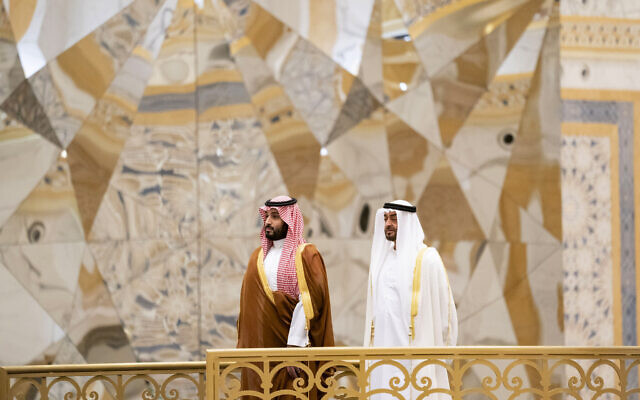
Saudi Crown Prince Mohammed bin Salman, left, attends a ceremony with Abu Dhabi Crown Prince Mohammed bin Zayed Al Nahyan at Qasr Al Watan in Abu Dhabi, United Arab Emirates, November 27, 2019. (Mohamed Al Hammadi/ Ministry of Presidential Affairs via AP)
Prime Minister Benjamin Netanyahu on Monday reportedly told a top Knesset panel that Saudi Arabia and the United Arab Emirates would finance the reconstruction of the Gaza Strip after the war against Hamas.
“The first step in Gaza will be to defeat Hamas. After that, I believe that the United Arab Emirates and Saudi Arabia will support the rehabilitation of the Strip,” Netanyahu said in closed-door testimony to the Knesset’s Foreign Affairs and Defense Committee, in one of several remarks that were later leaked to some few Hebrew media outlets.
The basis for Netanyahu’s claim was not immediately clear. Neither oil-rich Gulf country has given any public indication that it would be willing to take on such a task.
Moreover, Arab and US officials have told The Times of Israel repeatedly over the past two months that Arab support for the reconstruction of Gaza is far from a given and that it will at best amount to a placeholder until the Palestinian Authority is ready to take over and advance a two-state solution.
Netanyahu, however, has all but ruled out both the return of the PA to Gaza, and a two-state solution

Saudi Crown Prince Mohammed bin Salman, left, attends a ceremony with Abu Dhabi Crown Prince Mohammed bin Zayed Al Nahyan at Qasr Al Watan in Abu Dhabi, United Arab Emirates, November 27, 2019. (Mohamed Al Hammadi/ Ministry of Presidential Affairs via AP)
Prime Minister Benjamin Netanyahu on Monday reportedly told a top Knesset panel that Saudi Arabia and the United Arab Emirates would finance the reconstruction of the Gaza Strip after the war against Hamas.
“The first step in Gaza will be to defeat Hamas. After that, I believe that the United Arab Emirates and Saudi Arabia will support the rehabilitation of the Strip,” Netanyahu said in closed-door testimony to the Knesset’s Foreign Affairs and Defense Committee, in one of several remarks that were later leaked to some few Hebrew media outlets.
The basis for Netanyahu’s claim was not immediately clear. Neither oil-rich Gulf country has given any public indication that it would be willing to take on such a task.
Moreover, Arab and US officials have told The Times of Israel repeatedly over the past two months that Arab support for the reconstruction of Gaza is far from a given and that it will at best amount to a placeholder until the Palestinian Authority is ready to take over and advance a two-state solution.
Netanyahu, however, has all but ruled out both the return of the PA to Gaza, and a two-state solution
The premier intensified his rhetoric further against the PA during his Knesset appearance on Monday, with leaked transcripts quoting him as saying, “the difference between Hamas and the PA is that Hamas wants to destroy us here and now, while the PA wants to do it in stages.”
“We cooperate with the PA against Hamas when it serves both of our interests, up to a certain extent,” he added.
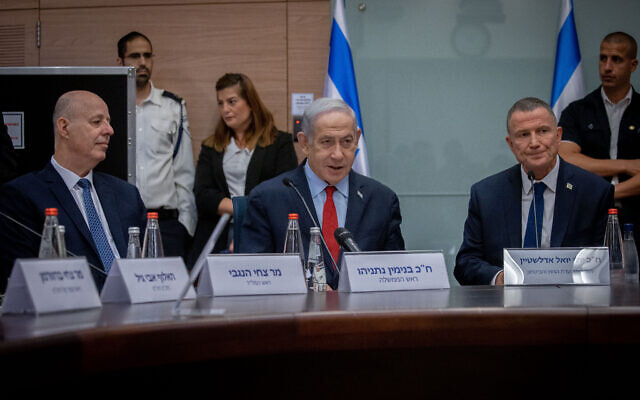
Prime Minister Benjamin Netanyahu, center, attends a Knesset Foreign Affairs and Defense Committee meeting at the Knesset, on June 13, 2023. (Oren Ben Hakoon/Flash90)
The Palestinian Authority supports a two-state solution; PA President Mahmoud Abbas has repeatedly spoken out against using violence and its security forces cooperate with the IDF to thwart terror in the West Bank. However, the PA also maintains a welfare program that includes payments to terrorists and their families, and Abbas has failed to condemn Hamas over the October 7 onslaught, with the Ramallah-based government at its weakest state in decades in terms of funding, influence, and public support.
Last month, Netanyahu’s cabinet voted to withhold $275 million in Palestinian tax revenues that Israel collects on the PA’s behalf. The sum amounts to what the PA allocates for services and salaries in the Gaza Strip. The government has described the move as part of Israeli efforts to disconnect from Gaza after thousands of terrorists from the Hamas-run enclave butchered some 1,200 people in Israel and kidnapped around 240 others. The $275 million cut also makes up roughly 30 percent of the total monthly revenues owed to Ramallah.
In response, the already cash-strapped PA decided not to accept any of the tax revenues. The decision further risks its collapse, a development that could make Israel responsible for some three million Palestinians in the West Bank.
Israel’s security establishment and the Biden administration have implored the government to transfer the funds, and to allow the roughly 200,000 West Bank Palestinians to return to their jobs in Israel and Israeli settlements, from which they have been barred since October 7, due to security concerns.
But the largely hardline government has dismissed the calls. Netanyahu held another security cabinet discussion on the matter, but refrained from calling a vote after determining there was not enough support for such measures to pass.
Foreign Affairs and Defense Committee lawmakers on Monday pressed Netanyahu on his plan for the day after in Gaza, as he has largely focused on rejecting others’ proposals, rather than offering any of his own.
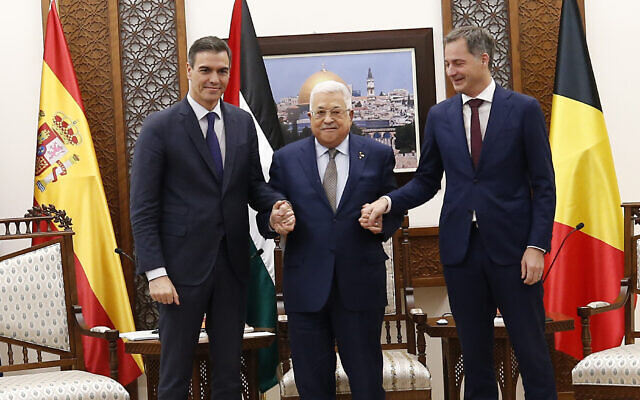
Palestinian President Mahmoud Abbas, center, meets with Spain’s Prime Minister Pedro Sanchez, right, and Belgium’s Prime Minister Alexander De Croo in the West Bank city Ramallah, on November 23, 2023. (Alaa Badarneh/ Pool via AP)
The premier reportedly told the MKs that he tasked the National Security Council with coming up with some options, but offered little detail beyond that.
ADVERTISEMENT
He did say that a “civil authority” would operate the Strip, which analysts understand to mean a technocratic government made up largely of individuals tied to the PA who have been inactive since the governing body’s leaders were ousted from the Strip in 2007. The term “civil authority” is preferred by the right-wing backers of this plan, in order to avoid referring to the PA.
“We need to put Gaza through a process of de-Nazification, like Germany and Japan went through after the World War,” Netanyahu was quoted by Hebrew media as having told the lawmakers.
Despite the steps maintained by the security cabinet to weaken the PA, Netanyahu insisted that he would be able to build on the Abraham Accords normalization agreements with Arab and Muslim nations after the war, according to leaked transcripts of his testimony.
He said he will pursue deals with Gulf countries, including Saudi Arabia, which he will “harness” to support the reconstruction of Gaza.
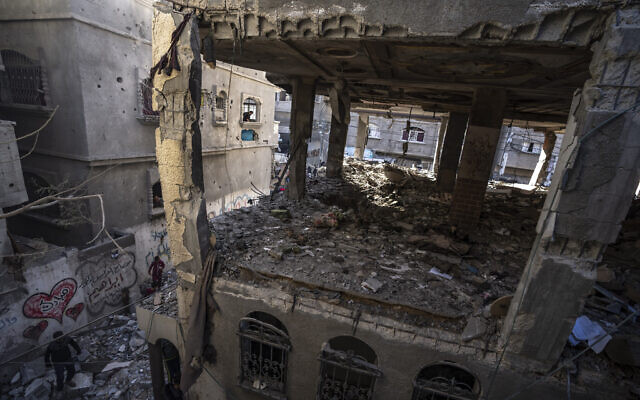
Palestinians check a house destroyed in an Israeli strike on Rafah, Gaza Strip, December 11, 2023. (AP Photo/ Fatima Shbair)
US President Joe Biden insists that Saudi Arabia was close to normalizing ties with Israel before the war and that blocking that deal was one of Hamas’s motivations when it launched the October 7 onslaught.
Since the war’s outbreak, the Arab world has been united in its fierce rejection of Israel’s response, leading international calls for a ceasefire.
While some Arab officials privately acknowledge their general support for Israel’s goal of removing the Islamist terror group from Gaza, they speak out fiercely against the number of civilian casualties in the Strip, which they fear are capable of destabilizing their own countries, where public outrage has been massive.
Netanyahu was also asked whether Israel’s decision to allow inspections of humanitarian aid to take place at the Kerem Shalom Crossing into Gaza was a precursor to a decision to reopening for the delivery of goods into the Strip as well.
Until now, Netanyahu has bucked US calls to that end, defending Israel’s decision to delink from Gaza while refusing to reopen the crossing as long as hostages remain in Gaza. But in Monday’s session, the premier was non-committal, saying that allowing aid into Gaza gives Israel more diplomatic flexibility to extend its military campaign.
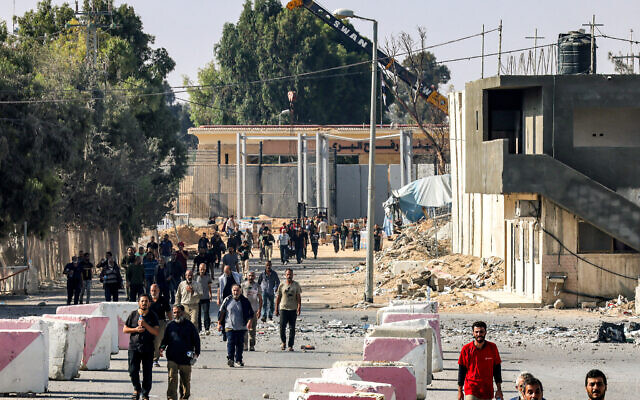
Palestinian workers, who were stranded in Israel since the October 7 attacks, walk near the Rafah border crossing with Egypt as they make their way to cross back into the Gaza Strip at the Kerem Shalom commercial border crossing with Israel in the south of the Palestinian enclave on November 3, 2023. (SAID KHATIB / AFP)
Similar to what Netanyahu has said is the plan for Gaza, the premier told the lawmakers he is insisting on the establishment of a buffer zone on the Lebanese border as well, given repeated attacks by the Iran-backed Hezbollah terror group. He said this would ideally be obtained through diplomatic efforts, but that Israel would use force if it had to and “would not compromise on this issue.”
At one point during the committee meeting, relatives of some of the hostages in Gaza sought to enter to speak with Netanyahu. The panel’s chair, Yuli Edelstein of Likud, refused to let them in, saying they already spoke with lawmakers during an earlier meeting, according to the Kan public broadcaster.
But Labor chair Merav Michaeli pressed Netanyahu to intervene and hear out the hostages’ families.
“Remember that there are also old people around your age who are in Hamas captivity,” Michaeli told the 74-year-old Netanyahu.
Not appreciating the swipe at the premier’s age, Likud backbencher Tally Gotliv shot back, “Don’t call the prime minister an old man!”
One of the relatives was heard shouting at Netanyahu from outside the room, begging him to allow her in and leading him to briefly stop his testimony.
ADVERTISEMENT
Netanyahu went on to insist to the lawmakers that continuing the military operation was the only way to force Hamas to release the hostages. A growing number of the abductees’ relatives are pushing back against the strategy, with their loved ones held hostage in Gaza for 67 days.
Several Hebrew media outlets also reported that during the meeting, Netanyahu said the Oslo Accords caused as many deaths as Hamas’s October 7 attacks, “though over a longer period.”
The Ynet news site said Michaeli interrupted to protest the comparison but was shut down by Edelstein.
No comments:
Post a Comment